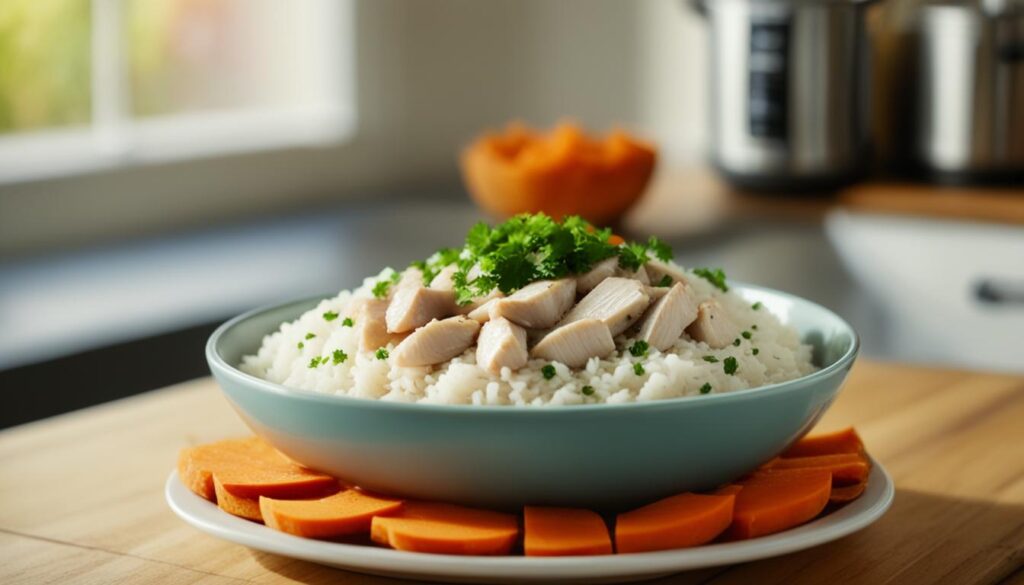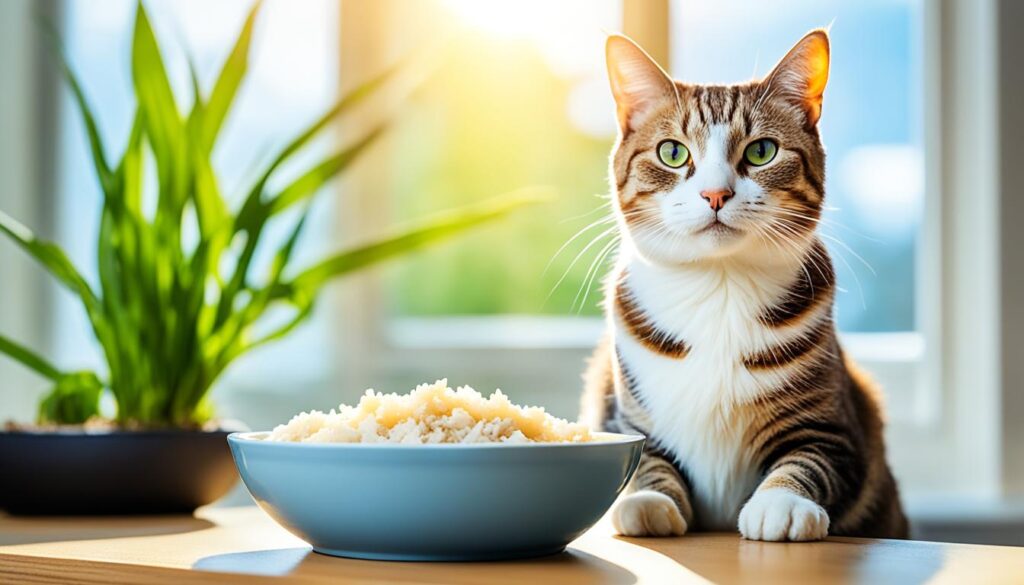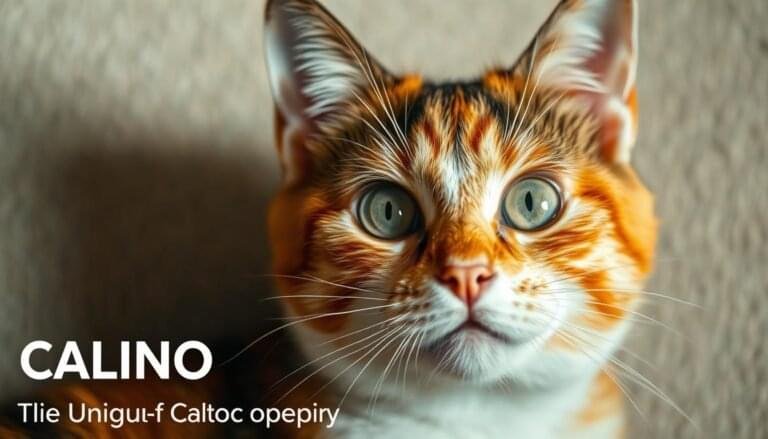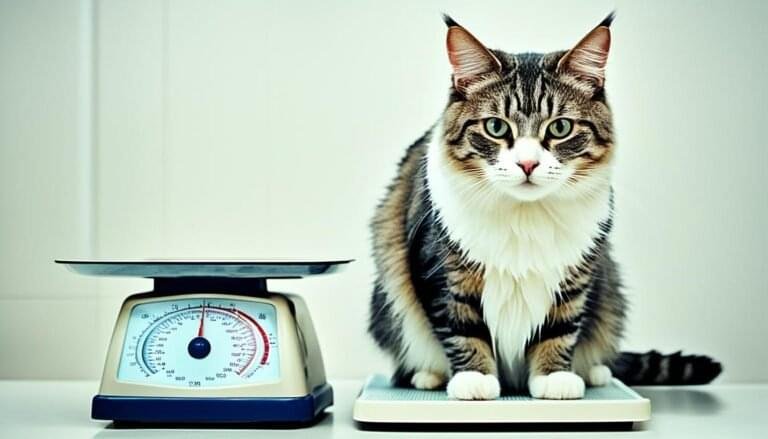Did you know that approximately 10% of cats experience digestive issues at some point in their lives?
When our feline friends have upset stomachs, it can be distressing for both them and us. Knowing what to feed a cat with an upset stomach is essential to help them feel better and get back to their normal selves.
In this article, I will guide you through the best foods to soothe your cat’s upset stomach, as well as provide useful tips to prevent future digestive issues. From bland diets to easy-to-digest cat food options, you’ll have the tools you need to provide relief for your furry companion.
What to Feed Cats with Upset Stomach: Key Takeaways:
- Approximately 10% of cats experience digestive issues.
- Knowing what to feed a cat with an upset stomach is crucial.
- Bland diets and easy-to-digest cat food can help soothe your cat’s stomach.
- Preventing future digestive issues requires attention to your cat’s diet and environment.
- Consulting with a veterinarian is important for proper diagnosis and treatment.
Signs Your Cat Has an Upset Stomach
Recognizing the signs of an upset stomach in cats is essential for prompt intervention and appropriate care. Cats may display various symptoms when experiencing digestive discomfort. Some common signs of an upset stomach in cats include:
- Vomiting
- Decreased appetite
- Drooling
- Diarrhea
- Straining to defecate
- Foaming at the mouth
- Hiding
- Lethargy
It is important to note that these symptoms can vary depending on the underlying cause of the upset stomach. In some cases, cats may exhibit multiple symptoms, while others may only display a few. If your cat shows any of these signs, it may be indicative of an upset stomach, warranting further examination and care.
Understanding the Symptoms
Vomiting is the most common sign of an upset stomach in cats. It can occur sporadically or persistently, depending on the severity of the condition. Decreased appetite is another symptom to watch out for. Cats with upset stomachs may refuse to eat or only consume small amounts of food. Additionally, drooling, diarrhea, and straining to defecate can also indicate digestive discomfort.
Other less apparent signs of an upset stomach in cats include foaming at the mouth, hiding, and lethargy. If you notice any of these behaviors in your feline companion, it is crucial to monitor their condition closely and seek veterinary attention if the symptoms persist or worsen.
When to Consult a Veterinarian
If your cat exhibits persistent vomiting, severe weight loss, or shows signs of pain and discomfort, it is essential to consult a veterinarian. Certain symptoms may indicate more serious health issues that require professional intervention. Veterinary attention should also be sought if your cat experiences multiple episodes of vomiting and diarrhea, loss of appetite, chronic soft stool, lethargy, or repeated episodes of vomiting throughout the day despite having an empty stomach.
A veterinarian will be able to diagnose the underlying cause of your cat’s upset stomach and provide appropriate treatment and care.
Causes of Upset Stomach in Cats
There are several potential causes for upset stomachs in cats, ranging from dietary issues to underlying health conditions. Understanding these causes can help pet owners identify the root of the problem and take appropriate measures to alleviate their cat’s discomfort.
1. Food Indiscretion
One common cause of upset stomachs in cats is food indiscretion. Cats may occasionally eat things they’re not supposed to, such as garbage, plants, or even toxic substances. These dietary indiscretions can lead to gastrointestinal upset and digestive disturbances.
2. Stress
Cats are sensitive creatures, and stress can have a significant impact on their overall health. Stressful situations, such as changes in the household, introduction of new pets, or loud noises, can trigger digestive issues and upset stomachs in cats.
3. Intestinal Parasites
Intestinal parasites, such as worms like roundworms, tapeworms, or hookworms, can cause gastrointestinal problems in cats. These parasites disrupt the normal functioning of the digestive system and lead to upset stomachs, diarrhea, and other related symptoms.
4. Food Allergies
Cats can develop allergies or sensitivities to certain foods, leading to digestive issues and upset stomachs. Common allergens include beef, dairy, fish, and grains. Identifying and eliminating these allergens from the cat’s diet can help alleviate the symptoms and prevent future episodes of gastrointestinal distress.
5. Underlying Health Issues
Underlying health issues can contribute to upset stomachs in cats. Conditions like inflammatory bowel disease, gastroenteritis, hyperthyroidism, kidney disease, liver disease, and hairballs can all cause digestive disturbances and discomfort for cats. It is essential to address these underlying health issues to effectively manage their symptoms.
| Causes | Symptoms |
|---|---|
| Food Indiscretion | Vomiting, diarrhea, loss of appetite |
| Stress | Decreased appetite, lethargy, hiding |
| Intestinal Parasites | Diarrhea, weight loss, bloating |
| Food Allergies | Vomiting, diarrhea, skin rashes |
| Underlying Health Issues | Chronic vomiting, weight loss, abnormal stools |
When Your Cat Should See a Veterinarian
If your cat’s upset stomach symptoms persist for longer than a few days, if there is severe vomiting or weight loss, or if they show signs of pain and discomfort, it is recommended to take them to a veterinarian. Other signs that require veterinary attention include:
- Multiple episodes of vomiting and diarrhea in a month
- Loss of appetite
- Chronic soft stool
- Lethargy
- Multiple episodes of vomiting throughout the day despite having no food or water in their stomach
Visiting a veterinarian is crucial to ensure the well-being of your cat and to rule out any underlying health issues that may be causing the upset stomach. A vet will conduct a thorough examination, which may include diagnostic tests, to determine the exact cause of the symptoms and provide appropriate treatment.
What to Feed a Cat With an Upset Stomach

When your cat is experiencing an upset stomach, it’s important to provide them with gentle, easy-to-digest foods that can help soothe their digestive system. Most veterinarians recommend feeding cats a bland diet to alleviate stomach discomfort and promote healing.
A bland diet typically consists of easily digestible proteins and carbohydrates. Boiled chicken and rice are often recommended as a go-to option for cats with upset stomachs. The chicken provides lean protein, while the rice is gentle on the stomach and can help firm up loose stools. You can also add a small amount of pumpkin to the diet, which aids in digestion and can help regulate bowel movements.
It’s important to note that portions should be small and offered in frequent meals to prevent overwhelming the digestive system. Monitor your cat’s response to the bland diet, and gradually introduce their regular diet back to them once their stomach has settled.
If you prefer a commercially available option, veterinary prescription diets like Hill’s Prescription Diet i/d Digestive Care Cat Food can provide a balanced and easily digestible alternative. These diets are formulated with specific ingredients to support digestive health and promote recovery from gastrointestinal upset.
| Feeding Options for Cats with Upset Stomachs | Description |
|---|---|
| Boiled chicken and rice | A combination of lean chicken and easily digestible rice that helps settle the stomach and regulate bowel movements. |
| Pumpkin | A small amount of pumpkin can aid in digestion and provide fiber to support healthy bowel movements. |
| Hill’s Prescription Diet i/d Digestive Care Cat Food | A veterinary prescription diet formulated with easily digestible ingredients to support digestive health. |
Before making any dietary changes for your cat, it’s essential to consult with your veterinarian. They can provide personalized recommendations based on your cat’s specific needs and underlying health conditions. Additionally, if your cat’s upset stomach persists or worsens, it’s crucial to seek veterinary attention for a thorough examination and appropriate treatment.
Home Remedies for Cat Upset Stomach
If your cat is experiencing an upset stomach, there are a few home remedies that you can try to help alleviate their discomfort. However, it’s important to remember that these remedies are not a substitute for veterinary care, and consulting with a vet is crucial to rule out any serious underlying health issues.
Probiotics for Cats
One home remedy for a cat’s upset stomach is to provide them with probiotics labeled specifically for cats. Probiotics are beneficial bacteria that can help restore the balance of good bacteria in the gut, promoting healthy digestion. Look for probiotic supplements that are specially formulated for cats and follow the recommended dosage instructions.
Greek Yogurt
Another home remedy is to add plain Greek yogurt to your cat’s food. Greek yogurt contains probiotics and can help soothe their stomach. Be sure to choose plain yogurt without any added sugars or flavors. Start by adding a small amount to their food and monitor their reaction. If they tolerate it well, you can gradually increase the amount.
Hairball Remedy Supplements
If your cat frequently suffers from hairballs, using hairball remedy supplements may help prevent or reduce stomach upset caused by hairballs. One popular hairball remedy supplement is Tomlyn Hairball Remedy. It helps lubricate the digestive tract and supports the natural elimination of hairballs. Follow the instructions on the packaging for the correct dosage.
Remember, before trying any home remedies, it’s essential to consult with a vet. They can provide advice tailored to your cat’s specific needs and help determine the underlying cause of their upset stomach.
How to Prevent Upset Stomach in Cats

Preventing upset stomachs in cats is essential for their overall health and happiness. By following a few simple tips and guidelines, you can help keep your feline friend’s digestive system in top shape.
Feeding Routine for Cats
Creating a consistent feeding routine for your cat is crucial in preventing upset stomachs. Cats are creatures of habit and thrive on a regular feeding schedule. Here are some tips for establishing a feeding routine:
- Feed your cat at the same time every day, preferably in a quiet and stress-free environment.
- Measure and portion their meals according to their age, weight, and activity level.
- Provide fresh water at all times and ensure your cat stays hydrated.
- Avoid sudden changes in their diet, as this can upset their stomach. If you need to switch their food, do so gradually, mixing the new food with the old food over the course of a week.
By following a consistent feeding routine, you can help prevent your cat from overeating, which can lead to digestive issues.
Toxic Plants, Strings, and Ribbons
It’s important to be aware of the potential hazards that toxic plants, strings, and ribbons can pose to your cat’s digestive system.
Certain plants, such as lilies, azaleas, and poinsettias, can be toxic to cats if ingested. Keep these plants out of their reach and consider using cat-safe alternatives, such as cat grass or catnip, to satisfy their natural chewing instincts.
Additionally, strings and ribbons can be enticing to cats but can cause serious harm if swallowed. Ensure that these items are safely stored away and not accessible to your cat.
Avoiding toxic plants, strings, and ribbons can significantly reduce the risk of your cat experiencing an upset stomach or other digestive issues.
Interactive Feeding Toys
Using interactive feeding toys can be a great way to prevent upset stomachs in cats. These toys engage your cat’s natural hunting instincts and slow down their eating pace. By making mealtime more mentally stimulating and physically challenging, these toys can help prevent vomiting caused by eating too quickly.
One highly recommended interactive feeding toy is Doc & Phoebe’s indoor hunting cat feeder kit. This innovative product allows your cat to “hunt” for their food, mimicking their natural instincts and providing mental stimulation.
By incorporating interactive feeding toys into your cat’s routine, you can promote healthy digestion and prevent digestive issues.
How to Tell if Your Cat Has a Sensitive Stomach
If you notice that your cat is experiencing frequent vomiting, hairballs, or unexplained weight loss, they may have a sensitive stomach. These symptoms should not be ignored, as they can indicate underlying health issues that require veterinary attention. Taking proactive steps to identify a sensitive stomach in your cat can help ensure their well-being and quality of life.
Vomiting is a common sign of a sensitive stomach in cats. If you find that your cat vomits food or hairballs once a month or more, it may be a cause for concern. While occasional vomiting can be normal, frequent or chronic vomiting should not be overlooked.
Another indication of a sensitive stomach is the presence of hairballs. Cats groom themselves regularly and ingest hair in the process. Hairballs are usually expelled through vomiting or passing stool. However, if your cat is experiencing an excessive number of hairballs, it may be a sign that their digestive system is not functioning optimally.
In addition to vomiting and hairballs, other signs of a sensitive stomach in cats can include unexplained weight loss, decreased appetite, and changes in behavior. If your cat exhibits any of these symptoms, it is crucial to consult with a veterinarian to determine the underlying cause and develop an appropriate treatment plan.
Regular veterinary visits are essential for the overall health and well-being of your cat. If you suspect that your cat has a sensitive stomach, it is recommended to schedule a thorough examination with a trusted veterinarian. They can perform a comprehensive evaluation, run diagnostic tests if necessary, and provide professional guidance and treatment options tailored to your cat’s specific needs.
| Signs of a Sensitive Stomach in Cats |
|---|
| Vomiting food or hairballs once a month or more |
| Unexplained weight loss |
| Decreased appetite |
How to Find the Best Food for Your Cat’s Sensitive Stomach
When it comes to finding the best food for your cat’s sensitive stomach, it’s important to take a strategic approach. Under the guidance of a veterinarian, a diet trial can be an effective method to determine the most suitable food for your furry friend. This trial may involve experimenting with different types of diets, such as a limited ingredient diet, a veterinary prescription food with a novel protein source, or a hydrolyzed protein diet.
Starting with a limited ingredient diet can help identify potential food allergies or sensitivities. These diets contain a minimal number of carefully selected ingredients, avoiding common allergens like grains, dairy, and certain proteins. By gradually introducing different protein sources and monitoring your cat’s response, you can pinpoint the specific ingredients that trigger digestive issues.
In some cases, a veterinary prescription diet may be necessary. These specialized foods are formulated to address specific digestive disorders and are available by prescription only. Your vet can recommend a suitable prescription food that meets your cat’s dietary needs and supports their overall digestive health.
Another option to consider is a hydrolyzed protein diet. These diets provide protein sources that have been broken down into smaller, more easily digestible fragments. This can be beneficial for cats with sensitive stomachs, as it reduces the likelihood of an adverse reaction to certain proteins.
It’s important to note that each cat is unique, and their individual response to different diets may vary. Finding the best food for your cat’s sensitive stomach may require some trial and error. By closely monitoring your cat’s digestion, stool quality, and overall well-being, you can make informed decisions about their diet and ensure their comfort and health.
Remember, always consult with your veterinarian before making any changes to your cat’s diet or initiating a diet trial. They can provide expert guidance tailored to your cat’s specific needs and help you navigate the process of finding the best food for their sensitive stomach.
Pros and Cons of Different Cat Food Options for Sensitive Stomachs
| Diet Option | Pros | Cons |
|---|---|---|
| Limited Ingredient Diet |
|
|
| Veterinary Prescription Food |
|
|
| Hydrolyzed Protein Diet |
|
|
Other Ways to Help a Cat With a Sensitive Stomach
Aside from dietary changes, there are other strategies you can implement to improve your cat’s sensitive stomach:
- Change the form of their food: Switching from dry food to wet food or vice versa can make a significant difference for cats with sensitive stomachs. Wet food tends to be easier to digest, while dry food can help promote dental health. Experiment with different options to see what works best for your cat.
- Implement a feeding routine: Establishing a consistent feeding routine can help regulate your cat’s digestion and reduce the likelihood of upset stomach episodes. Feed small, frequent meals throughout the day rather than leaving food out constantly. This can help prevent overeating and minimize digestive issues.
- Use interactive feeding methods: Incorporating interactive feeding toys or puzzles can make mealtime more engaging for your cat. These toys encourage physical activity and mental stimulation while slowing down eating. Slower eating can aid digestion and reduce the chances of vomiting or other stomach problems.
Taking these additional measures can supplement the dietary changes and enhance the overall well-being of your cat with a sensitive stomach.
Conclusion
In conclusion, caring for a cat with an upset stomach requires a comprehensive approach. Start by identifying the underlying cause of the upset stomach, which may include food indiscretion, stress, or underlying health issues. Consulting with a veterinarian is crucial for proper diagnosis and guidance.
Once the cause is determined, making necessary dietary and lifestyle changes is essential. This may involve feeding a bland diet, introducing probiotics or hairball remedy supplements, or switching to a specialized cat food for sensitive stomachs. It is important to follow the veterinarian’s recommendations and monitor your cat’s symptoms.
If the condition persists or worsens, seeking veterinary attention is vital. Multiple episodes of vomiting, weight loss, or signs of pain and discomfort should not be ignored. A veterinarian can provide further evaluation, treatment, and additional care options.
By taking proactive steps, working closely with a veterinarian, and implementing appropriate care measures, you can help your cat recover from an upset stomach and ensure their overall well-being.
FAQ
What are some soothing foods for cats with upset stomachs?
What are the signs that my cat has an upset stomach?
What are the causes of an upset stomach in cats?
When should I take my cat to a veterinarian for an upset stomach?
What should I feed my cat with an upset stomach?
Are there any home remedies for a cat’s upset stomach?
How can I prevent my cat from getting an upset stomach?
What are the signs of a sensitive stomach in cats?
How can I find the best food for my cat’s sensitive stomach?
Are there other ways to help a cat with a sensitive stomach?
How should I take care of a cat with an upset stomach?
References
| International Cat Association (TICA) | https://www.tica.org/ |
| The Cat Fanciers’ Association (CFA) | https://cfa.org/ |
| World Cat Federation (WCF) | https://www.wcf-online.de/ |
| Fédération Internationale Féline (FIFe) | https://www.fifeweb.org/ |







